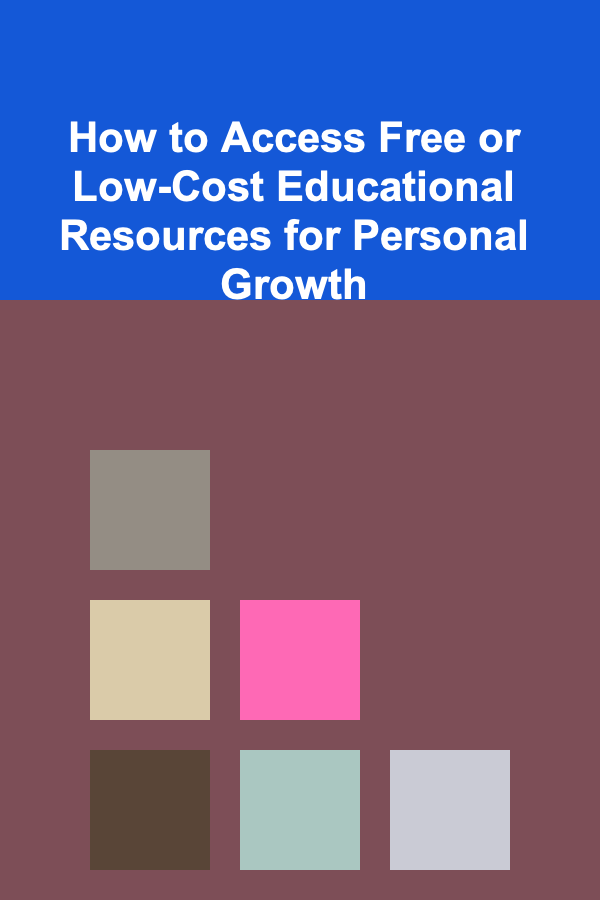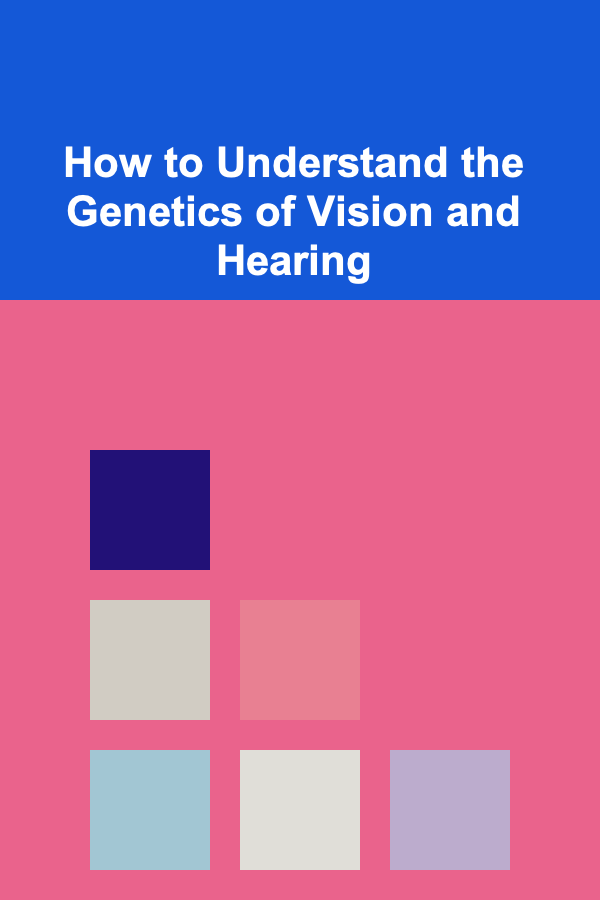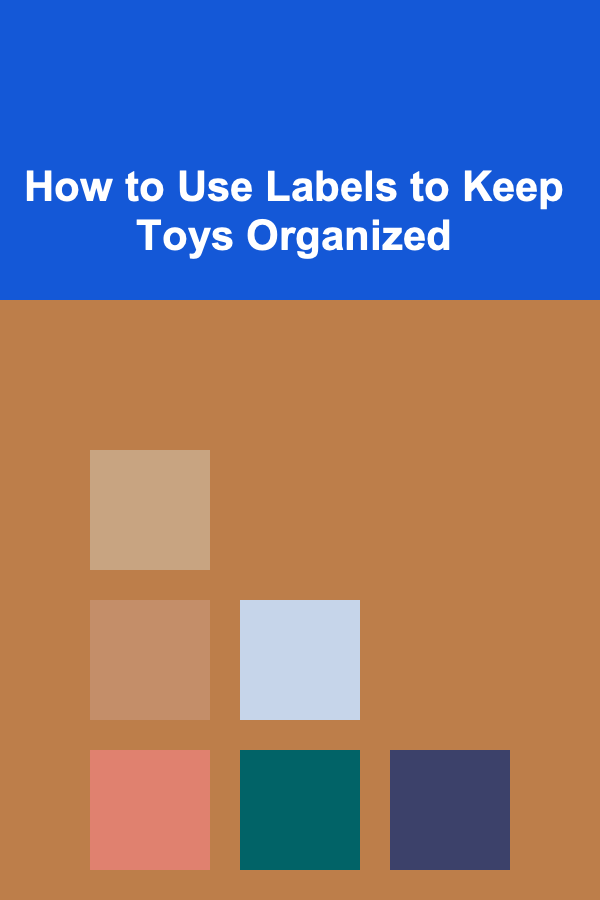
How to Access Free or Low-Cost Educational Resources for Personal Growth
ebook include PDF & Audio bundle (Micro Guide)
$12.99$9.99
Limited Time Offer! Order within the next:

Personal growth is a lifelong journey, and one of the most valuable tools you can leverage in this journey is education. Whether you are looking to improve your career prospects, develop new skills, or expand your knowledge on a specific topic, access to quality educational resources is crucial. However, education can often be expensive, and traditional institutions may not always be the most accessible or affordable option.
The good news is that there are numerous free or low-cost educational resources available to help you on your path of self-improvement. In this guide, we'll explore actionable ways to access these resources, ranging from online platforms to local libraries, community initiatives, and self-directed learning strategies.
Utilize Online Learning Platforms
The internet has democratized education in ways previously unimaginable. Today, there are a wealth of online platforms offering free or low-cost courses on a variety of subjects. These platforms cater to a wide range of interests and skill levels, from basic tutorials to advanced professional development.
1.1 Free Online Course Providers
- Coursera: Coursera offers courses from top universities and institutions like Stanford, Yale, and the University of London. While some courses require payment for certificates, many are free to audit. You can access video lectures, assignments, and other learning materials without any cost.
- edX: Similar to Coursera, edX provides online courses from prestigious institutions like Harvard, MIT, and UC Berkeley. Most courses are free to audit, but you can also choose to pay for a certificate if desired. There are plenty of subjects to choose from, including computer science, business, and personal development.
- Khan Academy: A pioneer in free education, Khan Academy offers an extensive library of lessons in subjects such as mathematics, science, economics, and history. The platform is particularly useful for younger learners but also provides adult learners with foundational knowledge that can aid in personal growth.
- MIT OpenCourseWare: For those seeking more in-depth academic learning, MIT OpenCourseWare offers free access to thousands of course materials, including lectures, readings, and problem sets. While MIT courses tend to be rigorous and advanced, they are invaluable for anyone serious about deepening their knowledge in areas like engineering, mathematics, and computer science.
1.2 Low-Cost Platforms
- Udemy: Udemy is a popular platform that offers affordable courses on virtually every subject imaginable, from technical skills like coding to creative skills like photography. While some courses can be expensive, frequent discounts and promotions often make these courses available for as little as $10 to $20.
- Skillshare: Skillshare is another great platform for learning creative skills, such as graphic design, writing, or video editing. They offer both free trials and a subscription model that grants access to a wide range of courses. It's particularly useful for those looking to explore artistic or entrepreneurial endeavors.
1.3 YouTube Channels
YouTube has become a go-to platform for free educational content across countless domains. Many educators and experts share their knowledge in the form of tutorials, lectures, and discussions.
- TED-Ed: TED-Ed is a treasure trove of short, animated educational videos that cover a broad range of topics, from science to personal development to history. These bite-sized lessons are perfect for individuals seeking quick yet impactful learning experiences.
- CrashCourse: Known for its engaging and well-produced content, CrashCourse offers free video series on topics such as history, literature, philosophy, and science. Each series consists of multiple episodes, making it easy to follow along and absorb new information in a structured format.
Take Advantage of Free Libraries and Public Resources
While the digital age has made online learning more accessible, physical resources like libraries still offer an invaluable wealth of educational opportunities. Public libraries often provide free access to books, audio resources, and even online learning platforms.
2.1 Public Libraries
Most public libraries allow cardholders to borrow physical books at no cost. Whether you're looking for self-help books, biographies of influential figures, or academic textbooks on specific subjects, libraries have an extensive collection. Many libraries also offer access to free workshops, events, and seminars.
Moreover, libraries increasingly provide digital access to books, audiobooks, and online learning resources. Some public libraries even offer free subscriptions to platforms like Lynda.com (now LinkedIn Learning) and Kanopy, which hosts educational documentaries and films.
2.2 Free Digital Resources
- Project Gutenberg: For those interested in literature, Project Gutenberg offers over 60,000 free eBooks, including classic works from authors like Shakespeare, Jane Austen, and Charles Dickens. These texts can help you expand your understanding of literature, culture, and history without spending a dime.
- LibriVox: If you prefer audiobooks, LibriVox provides free public domain audiobooks recorded by volunteers from around the world. This is an excellent option for learning on the go, whether you're commuting, exercising, or relaxing.
Leverage Social Media and Online Communities
Social media can serve as an educational tool, offering access to expert knowledge, discussions, and shared resources. Engaging with online communities can provide insights that may not be found in formal courses.
3.1 Join Facebook Groups and Reddit Communities
There are countless Facebook groups and subreddits dedicated to personal growth and specific learning goals. Whether you're looking to learn a new language, improve your fitness, or develop leadership skills, there's likely a community where like-minded individuals share valuable resources, tips, and advice.
- Reddit : Subreddits like r/selfimprovement , r/learnprogramming , and r/personalfinance host discussions and links to helpful content. The collaborative nature of Reddit communities makes it an excellent place to share knowledge and ask questions.
- Facebook Groups: Join groups that align with your learning interests, whether they are focused on entrepreneurship, health and wellness, or creativity. These groups often provide links to free resources, shared articles, and expert advice.
3.2 Follow Thought Leaders and Influencers
On platforms like Twitter, LinkedIn, and Instagram, thought leaders and subject-matter experts regularly share articles, videos, and advice that can help you stay informed and motivated. Look for individuals who align with your areas of interest, and consider subscribing to their newsletters or following their social media profiles to access valuable learning materials.
Engage in Self-Directed Learning and Practice
In addition to formal resources, one of the most powerful ways to grow personally and professionally is through self-directed learning. This method involves taking the initiative to explore, experiment, and reflect on your own learning process.
4.1 Set Clear Learning Goals
Identify specific areas where you want to grow. Whether it's improving your public speaking, learning a new programming language, or mastering mindfulness, setting clear and achievable goals will help you stay motivated and track your progress.
- SMART Goals: Follow the SMART (Specific, Measurable, Achievable, Relevant, Time-bound) framework to structure your goals. For example, instead of saying, "I want to learn French," a SMART goal would be, "I will learn 50 new French words each week for the next three months."
4.2 Build a Routine and Stay Consistent
Learning requires consistency, and establishing a routine can help you stay on track. Set aside a specific time each day or week for your learning activities, whether that's watching a video, reading a book, or practicing a new skill.
4.3 Apply What You Learn
The best way to ensure growth is to apply what you learn in real-world situations. If you're learning a new language, practice speaking with others. If you're studying programming, work on projects that put your new knowledge into practice.
Participate in Free or Low-Cost Workshops and Webinars
Many organizations offer free or low-cost workshops, webinars, and seminars that provide valuable learning experiences. These events allow you to interact with experts and other learners while gaining knowledge on various topics.
5.1 Look for Local Events
Check with local community centers, educational institutions, and professional organizations for free or affordable workshops. These events often provide practical skills and knowledge in areas like career development, personal finance, and leadership.
5.2 Online Webinars and Conferences
The rise of virtual events has made it easier than ever to attend webinars and online conferences. Websites like Eventbrite and Meetup list free or affordable educational events hosted by professionals across various industries. Many of these events provide access to experts who share insights, tools, and strategies for personal growth.
Conclusion
Accessing free or low-cost educational resources for personal growth is not only possible but increasingly easier due to the wealth of resources available both online and offline. By utilizing online platforms, libraries, social media, and self-directed learning strategies, you can embark on a path of continuous improvement without breaking the bank. The key is to be proactive, consistent, and curious---your growth potential is limitless.

How to Plan for a Craft Room Makeover
Read More
How to Plan for Financial Success as a Millennial
Read More
How to Style Your Dining Room for Less
Read More
How to Understand the Genetics of Vision and Hearing
Read More
How to Use Labels to Keep Toys Organized
Read More
Why You Should Use a Whiteboard for Daily Reminders
Read MoreOther Products

How to Plan for a Craft Room Makeover
Read More
How to Plan for Financial Success as a Millennial
Read More
How to Style Your Dining Room for Less
Read More
How to Understand the Genetics of Vision and Hearing
Read More
How to Use Labels to Keep Toys Organized
Read More